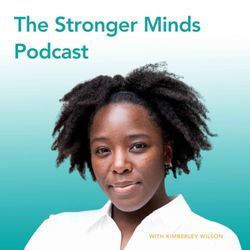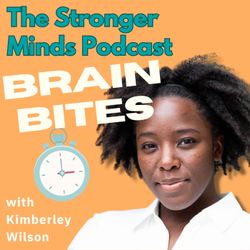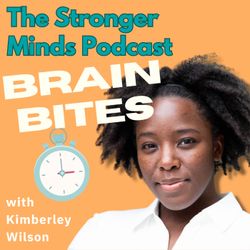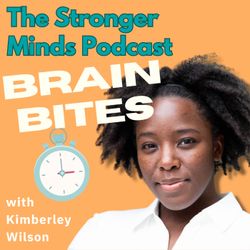Share

Stronger Minds
89. The Psychology of Food Choice
•
How do you choose what you are going to eat? Do you think about it for a long time? Do you plan it in advance? Or do you wait for inspiration in the moment? The science and psychology of what we choose to eat is as fascinating as it is complex. The unconscious, internal and external drivers of food choice are the topic of this week’s episode.
More episodes
View all episodes

175. Nutritional Interventions for Depression - New Guide!
06:10|Introducing my brand new evidence-based guide on nutritional interventions for depression.Listeners get £2 off until December 1st 2025. Click here.___SubstackCorporate Speaking How to Build a Healthy Brain* Unprocessed: What Your Diet is Doing to Your Brain* Original music by Juan Iglesias *Affiliate links The information shared on this podcast is for educational and informational purposes only and is not a substitute for professional medical advice, diagnosis, or treatment. Always seek the advice of a qualified health provider with any questions you may have regarding a medical condition or treatment. Never disregard professional medical advice or delay in seeking it because of something you heard on this podcast. Reliance on any information provided here is solely at your own risk. Remember, your health is unique to you, so consult your healthcare provider for guidance tailored to your personal needs.
174. Alexithymia
18:47|How not having words for your feelings affects your physical and mental health - and what you can do about it. ___SubstackCorporate Speaking How to Build a Healthy Brain* Unprocessed: What Your Diet is Doing to Your Brain* Original music by Juan Iglesias *Affiliate links The information shared on this podcast is for educational and informational purposes only and is not a substitute for professional medical advice, diagnosis, or treatment. Always seek the advice of a qualified health provider with any questions you may have regarding a medical condition or treatment. Never disregard professional medical advice or delay in seeking it because of something you heard on this podcast. Reliance on any information provided here is solely at your own risk. Remember, your health is unique to you, so consult your healthcare provider for guidance tailored to your personal needs.
173. Brain Bite: Emotion Granularity
04:03|Researcher - Serena WilsonAssistant Producer - Serena Wilson___SubstackCorporate Speaking How to Build a Healthy Brain* Unprocessed: What Your Diet is Doing to Your Brain* Original music by Juan Iglesias *Affiliate links The information shared on this podcast is for educational and informational purposes only and is not a substitute for professional medical advice, diagnosis, or treatment. Always seek the advice of a qualified health provider with any questions you may have regarding a medical condition or treatment. Never disregard professional medical advice or delay in seeking it because of something you heard on this podcast. Reliance on any information provided here is solely at your own risk. Remember, your health is unique to you, so consult your healthcare provider for guidance tailored to your personal needs.
172. Grudges & Grievances - Part 2
20:01|Difficult Conversations___ SubstackCorporate Speaking How to Build a Healthy Brain* Unprocessed: What Your Diet is Doing to Your Brain* Original music by Juan Iglesias *Affiliate links The information shared on this podcast is for educational and informational purposes only and is not a substitute for professional medical advice, diagnosis, or treatment. Always seek the advice of a qualified health provider with any questions you may have regarding a medical condition or treatment. Never disregard professional medical advice or delay in seeking it because of something you heard on this podcast. Reliance on any information provided here is solely at your own risk. Remember, your health is unique to you, so consult your healthcare provider for guidance tailored to your personal needs.
171: Brain Bite: How Food Texture Affects Ultra-Processed Eating
04:50|A report on a new study on how texture affects eating speed and total food intake.NotesEpisode 99 - The Science of SatietyPsychology of Food - WaitlistSource___SubstackCorporate SpeakingHow to Build a Healthy Brain*Unprocessed: What Your Diet is Doing to Your Brain*Original music by Juan Iglesias*Affiliate linksThe information shared on this podcast is for educational and informational purposes only and is not a substitute for professional medical advice, diagnosis, or treatment. Always seek the advice of a qualified health provider with any questions you may have regarding a medical condition or treatment. Never disregard professional medical advice or delay in seeking it because of something you heard on this podcast. Reliance on any information provided here is solely at your own risk. Remember, your health is unique to you, so consult your healthcare provider for guidance tailored to your personal needs.
170. Grudges & Grievances - Part One
17:21|Are you a grudge holder o do you find it relatively easy to forgive and forget? In this part one episode I'm getting to grips with grudges; what they are and what they help us to achieve and avoid.___SubstackCorporate Speaking How to Build a Healthy Brain* Unprocessed: What Your Diet is Doing to Your Brain* Original music by Juan Iglesias *Affiliate links The information shared on this podcast is for educational and informational purposes only and is not a substitute for professional medical advice, diagnosis, or treatment. Always seek the advice of a qualified health provider with any questions you may have regarding a medical condition or treatment. Never disregard professional medical advice or delay in seeking it because of something you heard on this podcast. Reliance on any information provided here is solely at your own risk. Remember, your health is unique to you, so consult your healthcare provider for guidance tailored to your personal needs.
169. Brain Bites: The Sustaining Phantasy
03:59|Shining the spotlight on a special kind of daydream used as a source of comfort at times of high stress.Read the essay_____SubstackCorporate Speaking How to Build a Healthy Brain* Unprocessed: What Your Diet is Doing to Your Brain* Original music by Juan Iglesias *Affiliate links The information shared on this podcast is for educational and informational purposes only and is not a substitute for professional medical advice, diagnosis, or treatment. Always seek the advice of a qualified health provider with any questions you may have regarding a medical condition or treatment. Never disregard professional medical advice or delay in seeking it because of something you heard on this podcast. Reliance on any information provided here is solely at your own risk. Remember, your health is unique to you, so consult your healthcare provider for guidance tailored to your personal needs.
